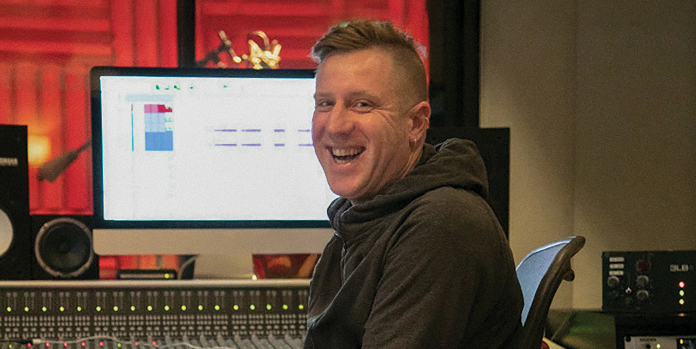LA-based mix engineer and record producer Mitch Kenny (OM 1993) can recount many “pinch me” moments throughout his career, but one in particular comes to mind.
“We were recording at Diana Ross’ house, and the first thing she did, because she’s lovely, was to offer to make me a cup of coffee,” Mitch says.
“I’m there and Diana Ross is making me a cup of coffee. That’s kind of strange!”
A big break in sunny Los Angeles
After getting his foot in the door as a mix engineer at Hollywood institution Record Plant Studios, Mitch recounts his “big break” as working on a Mary J Blige session with notable record producer Ron Fair, who Mitch says has a penchant for recognising talent.
This led to an opportunity to work on a chart-topping record for Nicole Scherzinger, who shared a record label with German record producer and DJ, Zedd. It was with Zedd’s 2012 Grammy Award-winning “Clarity” that Mitch got his “first big smash”.
He went on to gain experience working alongside artists as prominent as Quincy Jones and Beyoncé, before returning to Australia for a role with ABC Classic FM.
A career of creative contrast
In many ways, Mitch’s career has been one of complementary contrast.
While he was working on the ABC TV/Opera Australia comedy opera miniseries The Divorce, he was simultaneously working the Dark Night, Sweet Light record with electronic hip-hop duo Hermitude, which was nominated for seven ARIA awards including Engineer of the Year.
Mitch says that his approach to recording classical music is highly influenced by his work in pop music, so inevitably, “they both influenced each other”.
“I think I’m slightly bolder sonically in the classical realm, because what I do in pop music is pretty aggressive,” he says.
The art of mixing
At its core, Mitch says mixing is about three choices.
“I get to turn it up, I get to turn it down, or I get to take it out,” he says.
“It’s a little more complicated than that, but at its root, it’s about getting all the different parts balanced.”
First, he says, “sound is recorded by literally putting microphones in front of a sound source and capturing it.
“Once that’s all done, it comes to me, and I balance everything so you can hear everything presented as a coherent work.”
The production side, he says, is slightly different, “as that’s when you’ve got more input on what happens musically.”
A head in the game and a heart in the song
Having worked on two releases which have won Grammy Awards, and with multiple ARIA awards and Number 1 albums under his belt, Mitch speaks fondly about his musical origins in the Melbourne Grammar Orchestra.
“Having exposure to repertoire and an ability to read orchestral scores has made a huge difference in my work today,” he says.
“It translates to every other genre, from opera to hip hop.”
Mitch was already a talented cello player when he began at Wadhurst in Year 7, but was likely better known among his classmates as a basketballer.
His talent in the sport, which he recounts had a “lower profile” at school at the time, led him to tour and compete internationally during his school days.
But it was when his jazz-teaching basketball coach Rob Glaesemann let him sit in on Melbourne Grammar Big Band rehearsals that the seeds of Mitch’s career in music were truly sown.
After Year 12, Mitch initially enrolled in a Bachelor of Music Performance at the Victorian College of the Arts, but with the music industry calling, formal studies were put on hold.
Later, he completed a Bachelor of Music Technology at Victoria University, as well as a Master of in Music Technology at the University of Newcastle.
“Music for the sake of music”
In 2016, Mitch returned to Los Angeles, where he now lives with his wife and daughter. His recent work has included mixing the score for JJ Abrams–produced HBO crime thriller series “Duster”, Daniel Johns’ album “Future Never” as well as contributing to the Emmy award– winning score of Steven Spielberg’s documentary “Why We Hate”.
“I feel very lucky to have been able to work with the people I’ve worked with, but the fact is, this is an ego-free job,” he says.
“At the end of the day, we’re making music for the sake of music.”



